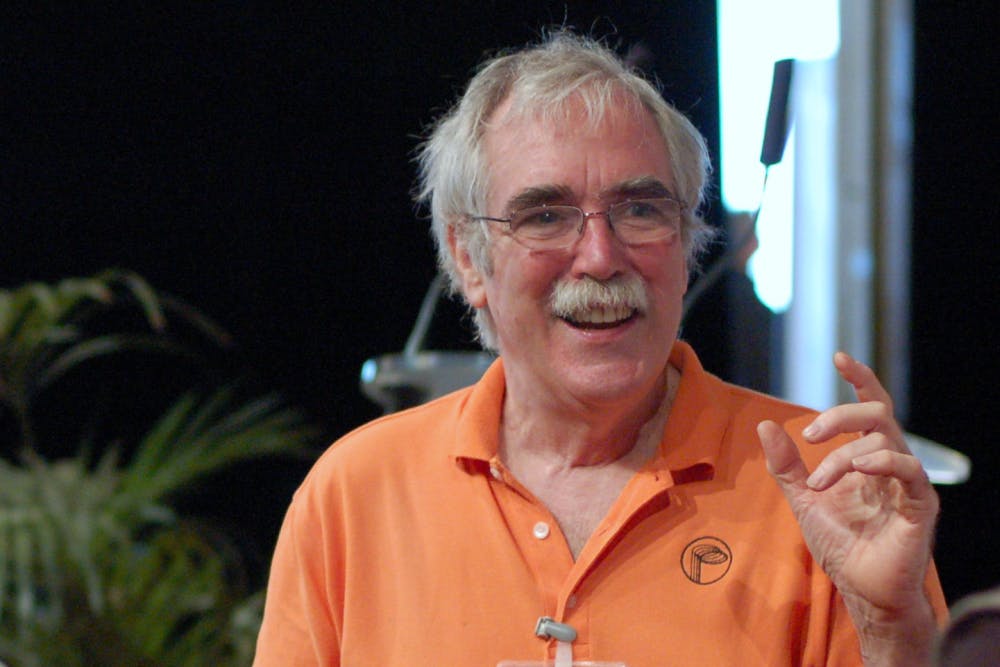Eric F. Wieschaus, Squibb Professor of Molecular Biology and Professor in the Lewis-Sigler Institute for Integrative Genomics, was inducted last month as a fellow of the American Association for Cancer Research (AACR) Academy.
The announcement states that the honor was awarded “for his Nobel Prize winning identification of genes responsible for controlling embryonic development and their impact on tumorigenesis, and for conducting large-scale mutagenesis screens in Drosophila melanogaster, or the fruit fly, to identify genes responsible for embryonic patterning and development.”
Wieschaus’ best-known work concerns the development of Drosophila embryos. His research involves mutating the genes of flies and assessing them for developmental abnormalities on a large scale.
The experiments reveal that the majority of mutations do not cause changes in the flies’ development; only around a hundred mutations result in defects in patterning and differentiation in the embryo. This set of maternal factors and signals establish a “tool box” of genes that govern proper development in Drosophila. Without them, the fly would not have the proper body segments and appendages, like wings and antennae.
According to Wieschaus, similar mechanisms apply not just to flies, but humans and other multicellular organisms as well.
“How can you use a laboratory animal, like a fly, to address basic questions?” Wieschaus asked.
Wieschaus stated that his earlier contributions were able to help to improve the understanding of birth defects, which is why his work won a Nobel Prize in Physiology or Medicine.
Although Wieschaus did not set out to research the question of what causes cancer, he found that embryonic development and tumorigenesis are connected. The same set of genes that controls the decision-making process of a developing embryo also governs decisions made throughout the life of an organism, Wieschaus said.

When these genes are mutated in an adult, he added, they can lead to cancer. For example, the hedgehog and armadillo genes that Wieschaus discovered in the 1970s contribute to the development of skin and colon cancer.
His current research focuses on describing the mechanics of embryonic development. Wieschaus seeks to answer the question of how cells or sheets of cells are able to form various movements and how the forces that drive that process are generated.
Wieschaus remarked that the relationship between the generation of those cellular forces, the mechanical properties of the cells, and the genetic activities that drive them poses an interesting and important question in biology.
“They may in the long run have some significance for cancer,” Wieschaus said of his recent work. “You never really know when you’re doing science. Anything you do, to have any significance at all, other people have to build on it.”

After graduating magna cum laude from University of Notre Dame with a B.S. in biology in 1969, Wieschaus earned his Ph.D. from Yale University in 1974 with the Swiss developmental biologist Walter Gehring as his doctoral advisor.
After a series of academic appointments, Wieschaus joined the University as an assistant professor of biology in 1981, and became an associate professor of biology in 1983. Wieschaus was named as a full professor in the molecular biology department in 1987 and appointed Squibb Professor of Molecular Biology in 1993.
Since 1997, Wieschaus has also been an investigator at the Howard Hughes Medical Institute as well as an adjunct professor of biochemistry at the Rutgers Robert Wood Johnson Medical School.
The AACR was founded in 1907 and is the world’s first professional organization dedicated to researching, preventing, and curing cancer. The AACR Academy recognizes scientists who have made significant contributions to this mission. This year, Wieschaus was one of 22 newly elected fellows inducted at the AACR annual meeting in Atlanta from March 29 to April 3.








